|
|
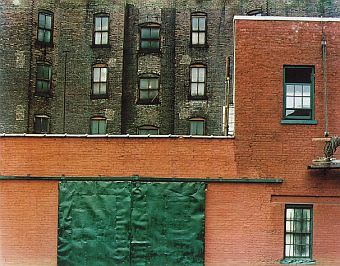
Red Brick Wall
New York, 1948
Arnold Newman
1918 - 2006
1 2 3 4 5
_______________________
Otoliths Nine
Rochelle Ratner, a frequent contributor to this journal, passed away on
March 31st. I'd like to dedicate this issue, in which she has new poems, to
her.
-
Mark Young
In this issue are Rochelle Ratner, harry k stammer, Adam Fieled, Bill Drennan, David-Baptiste Chirot, Joel Chace, Michael Farrell, Reed Altemus, Andrew Lundwall, Douglas Barbour & Sheila E. Murphy, William Doreski, Duane Locke, Stu Hatton, Joe Balaz, Jeff Harrison, Raymond Farr, Esa Mäkijärvi, Bobbi Lurie, Julian Jason Haladyn, Simon Perchik, Suzanne Grazyna, Eileen R. Tabios, Diana Magallón & Jeff Crouch, Jeff Crouch & Matina L. Stamatakis, Thomas Lowe Taylor, Glenn R. Frantz, Angela Genusa, Randy Thurman, Philip Byron Oakes, Mark Cunningham, Geof Huth, Andrew Topel & Jim Leftwich & John M. Bennett, John M. Bennett, John M. Bennett & Luigino Solamito & Sheila E. Murphy, John M. Bennett & Scott MacLeod, Scott MacLeod, Robert Gauldie, Adam Strauss, Marcia Arrieta, Elizabeth Kate Switaj, William Allegrezza, Ernesto Priego, Ed Schenk, Irving Weiss, Mary Kasimor, Christopher Major, Derek Owens, Paul Siegell, Daniel f Bradley, Daniel Morris, Steve Timm, Mary Ellen Derwis, Thomas Fink, Louise Landes Levi, Toni Simon, Martin Edmond & Kirsten Kaschock.
Remembering Rochelle Ratner: "Fish Tank"
"One Poet's Notes"
_______________________
Literature Minus One
a challenge from Waggish
... pick a work of literature or philosophy (or poetry, if you can make it work) and a sentence from that work that, if the sentence had been excluded from the work, would have made the greatest difference in the work's interpretation/reception/history in the following years.
_______________________

les pilotis
(detail)
Gérard Cambon
via gmtPlus9 (-15)
_______________________
The Force That Drives the Flower
Annie Dillard
born April 30, 1945
What is it about fecundity that so appalls? Is it that with nature's bounty goes a crushing waste that threatens our own cheap lives?(....)
Any three-year-old can see how unsatisfactory and clumsy is this whole business of reproducing and dying by the billions. We have not yet encountered any god who is as merciful as a man who flicks a beetle over on its feet....(more)
.....................................................
Noticer: The Visionary Art of Annie Dillard [PDF]
David Lavery
Unlicensed Metaphysics
Annie Dillard Revisited
David Lavery
The Ecotheology Of Annie Dillard: A Study In Ambivalence
Pamela A. Smith .....................................................
We don't know what's going on here . . . We don't know. Our life is a faint tracing on the surface of mystery, like the idle, curved tunnels of leaf miners on the face of a leaf. We must somehow take a wider view, look at the whole landscape, really see it, and describe what's going on here. Then we can at least wail the right question into the swaddling band of darkness, or, if it comes to that, choir the proper praise.
-
Annie Dillard, Pilgrim at Tinker Creek
_______________________
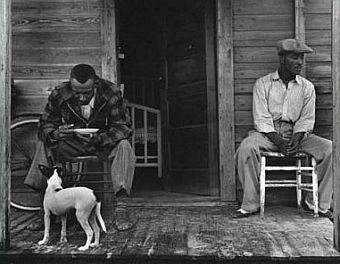
west palm beach
Arnold Newman
1941
Arnold Newman
Master of Environmental Portraiture
The Digital Journalist
_______________________
Money Talks
Listening to the history of value
Christine Desan
_______________________
The family, the school, the army, the factory are no longer the distinct analogical spaces that converge towards an owner--state or private power--but coded figures--deformable and transformable--of a single corporation that now has only stockholders. Even art has left the spaces of enclosure in order to enter into the open circuits of the bank. The conquests of the market are made by grabbing control and no longer by disciplinary training, by fixing the exchange rate much more than by lowering costs, by transformation of the product more than by specialization of production. Corruption thereby gains a new power. Marketing has become the center or the "soul" of the corporation. We are taught that corporations have a soul, which is the most terrifying news in the world. The operation of markets is now the instrument of social control and forms the impudent breed of our masters. Control is short-term and of rapid rates of turnover, but also continuous and without limit, while discipline was of long duration, infinite and discontinuous. Man is no longer man enclosed, but man in debt. It is true that capitalism has retained as a constant the extreme poverty of three-quarters of humanity, too poor for debt, too numerous for confinement: control will not only have to deal with erosions of frontiers but with the explosions within shanty towns or ghettos.
Gilles Deleuze, Postscript on the Societies of Control
_______________________
Glossator: Practice and Theory of the Commentary
Call for submissions
_______________________
The mad worlds of Thomas Middleton
Jonathan Bate
Times Literary Supplement
Sexing the language, languaging the sex, doubting all truth, mastering all dramatic modes: enough of a case for Middleton?
via sign and sight
_______________________
Sepia No More
Virginia Heffernan
As art-school photographers continue to shoot on film, embrace chiaroscuro and resist prettiness, a competing style of picture has been steadily refined online: the Flickr photograph.(....)
Four years later, amid the more than two billion images that currently circulate on the site, the most distinctive offerings, admired by the site’s members and talent scouts alike, are digital images that “pop” with the signature tulip colors of Canon digital cameras....(more)
_______________________
There are times out of mind, times spent alone in a strange place waiting, times when the mind is alive and the body almost ruined, when you hallucinate on the real, and see it in the context of its meaning.
- Annie Dillard, Four Bits
_______________________

Beggars' Bridge
Yorkshire
ca. 1890
Photochrom Prints
5,900 items
ca. 1890-1905
_______________________
Living Like Weasels
Annie Dillard
I think it would be well, and proper, and obedient, and pure, to grasp your one necessity and not let it go, to dangle from it limp wherever it takes you. Then even death, where you're going no matter how you live, cannot you part. Seize it and let it seize you up aloft even, till your eyes burn out and drop; let your musky flesh fall off in shreds, and let your very bones unhinge and scatter, loosened over fields, over fields and woods, lightly, thoughtless, from any height at all, from as high as eagles.

Sugar Pine Star Party
Tony and Daphne Hallas
astrophoto via graywyvern
_______________________
Millions Of Us
alice notley
Purportedly a chain of civilians, soldiers, voices
lice they were called. It is sometimes sufficient to beg
Lice creeping over one, kill them with a chemical;
then there are lice-ghosts everywhere. Glints of pearly
nails. The light of my beloved will keep me from noticing.
Trailor to keep her in; he asked me if I knew her 'auction name'.
Walked over the scorch; what are values when there's nothing here?
The wing of a dead soul grows into all the lace you see through,
foreigner, lice-ridden article of divestment. Splendid vices
pouring outcomes over the eager cash flow promotions.
So many of the dead came to me that their transparencies
covered my visage, I'm too near you. Don't you want to see?
We came from faraway camps, forsaking the human because it
broke our bodies into pieces for the torturer's pet, who
propositions you. There is always a slant on it. The trees must
go down; or light affects your eyes badly. We pleaded for an
adjustment, before we'd recognizably died. You
told me you were a heart, but you were guarding a tower. You
said you were a failure, but you helped destroy us.
Wings all over me, stuck to my skin, there's no point to it
why are you here when there's nothing? We just don't believe it.
...(more)
5_trope No. 24
March 2008
which, incidentally, pays homage to Maya Deren
thanks to William Walsh at Questionstruck
_______________________

Maya Deren
April 29, 1917 - October 13, 1961 Maya Deren at UbuWeb Film
In the Mirror of Maya Deren
Rebecca Bachman
Maya Deren's Meshes of the Afternoon and At Land
Reviewed by Marilyn Ferdinand
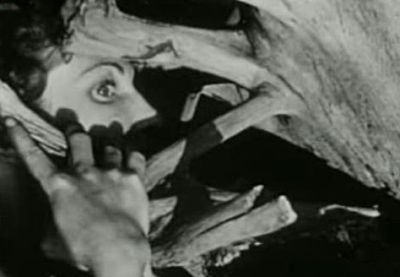
At Land
Maya Deren
1944
_______________________
On the economy of moralism and working class properness
An interview with Beverley Skeggs
Eurozine
... what is difficult is that we have lost the political parties that were left in Britain and also there is no kind of formal left in public culture. Although practically everyone I know would define themselves as on the left, it is quite a homeless position. And it worries me because if you only do criticism, it doesn't always produce very much. The shift has been so great within the left. After 30 years of neo-liberal policy that was taken up and taken further by the Tony Blair, or Tony Blatcher as he is called, the left space is something difficult to inhabit.(....)
... if you focus on identity it is about making a claim through respectability, staging resources in a particular way. As Wendy Brown notes, identity claims are based on some type of injury or suffering, often a dramatic suffering of some kind. And for me, identity politics could never work because if you are working class you suffer continuously and the one thing that you do not want to display is your injury and your suffering. You want to display your capacity to survive and endure, to struggle against and to overcome. To celebrate your injury, suffering, pain or victimhood does not work for the working-class... I think that with the focus on identity the whole thing shifted away from injustice into individuality as a form of capital. In Formations of Class and Gender, I wrote about women that did not want to be identified as working class because what it meant was to be pathologized; to be seen as excessively sexual, as bad mothers and so forth. They did not and could not use identity. With identity politics we see the middle classes again claiming all the resources for themselves, for example claiming to be victims of violence and in need of all kinds of security arrangements such as gated communities, tax breaks and so on. It is not only about resources but about the political agenda as well, it is a way for the middle class to claim injury and suffering when they have everything.
So when people say that we need the intersectional gesture to include race, class, gender, and everything else, what it usually means is to think about these things which exclude understandings of the relationship to the capitalist system....(more)
Respectability and Resistance: Interview with Professor Beverley Skeggs Redemption Blues
_______________________

That Our Needs Don't Disturb our Dreams
Martin Weber
A Map of Latin American Dreams
a solo exhibition of work by Martín Weber
via the Cloisters
Black Board
Martin Weber
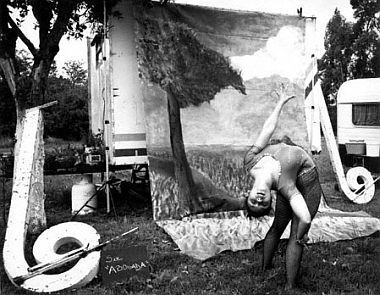
"to be a lawyer"
Martin Weber
_______________________
Open Source
the 68th edition of the Philosophers’ Carnival
via DuckRabbit
_______________________
On Translation
Linh Dinh
Poetry Foundation
I’m not a translator so much as a tightrope walker between two unreliable dictionaries.
It's not entirely true that translation is just thin jism on a moonless night, eggdrop soup minus the egg, or a thin man chasing a fat man's shadow.
Pound always took tremendous liberty with his translations. At the opposite end, you have Clayton Eshleman, who takes great pain to bring back these foreign objects whole, even effacing himself in the process. His inventions, interventions and style still exist, I'm sure, but he always strives to make his English “gown” hug the alien body as tightly as possible, unlike too many reckless translators out there. ...(more)
_______________________
Torture Space: Architecture in Black
Bryan Finoki
Subtopia
_______________________
Black Hole in Bush's Brain
Peter Chamberlin
Judging from the campaign rhetoric coming out of both camps, whoever wins the Oval Office will be inclined to continue the failed military policies in Iraq and to pursue a confrontation with Iran. Apparently it does not matter to either party what will follow those actions, or what these disastrous policies have produced as they played-out in Iraq and Afghanistan. It does not matter who gets elected, whether it is "bomb, bomb Iran" McCain, or "obliterate/massive retaliation" Clinton, nothing will change.(....)
This war is driven by multiple delusions, the main error being that it can eventually be won by the application of greater and greater amounts of force. Advocates of this strategy ignore the basic immorality of the argument, that victory at any price is an acceptable cost. If the American people remember their power and are given time to think about the direction of the war, they will realize how wrong these policies are. Considering that Bush is following a policy that generates more enemies than can be killed without the use of nuclear weapons and he shares Cheney's obsession with finding an excuse to nuke Iran, it becomes apparent that America's leaders are working against the people's interests....(more)
_______________________
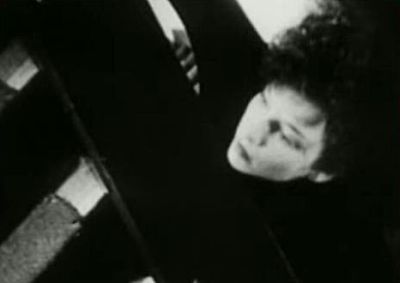
Meshes of the Afternoon
Maya Deren
1943
_______________________
To Ask Americans to Imagine History
Robert Gibbons
Bush is Franco. Picasso said in 1956 that his Guernica would “do the most good in America.” He must have assumed that Art makes a difference to philistines. German airplanes practiced new maneuvers carpet bombing civilians under the pretext of destroying a single bridge. On Monday’s April 26th market day, 1937, after 1,650 were slaughtered, bridge stood, church stood, sacred Guernican oak stood. Human flesh burned. Baghdad, Shock & Awe (liberation?), Falluja, uprooting insurgents (occupation?), Sadr City, destroying militia (civil war?). Way too much to ask Americans to imagine history beyond what they see in the rearview mirror of a Chevrolet! Alone in NYC, when Guernica knocked me back on my heels, turning the corner into that room of the Modern, I was struck by the awe & authenticity of terror’s only potential equal.
Robert Gibbons's logreturning soon after dealing with technical djinns
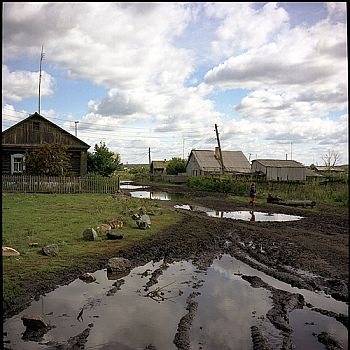
Matthias Stief
_______________________
Shadows across Frosted Glass
Juan José Saer
Translated from the Spanish by Matthew Lansburgh
words without borders
I know that what Mother wanted to tell me before she died was that she hated life. We hate life because we can’t live in its midst. And we want to live because we know we will die. But what has a solid core—rock, or bone, something dense and tightly woven, something which can be polished and modified with a rhythm different from the rhythm of death—can’t die. The voices we hear inside ourselves are incomprehensible, but they're the only voices we hear, and there’s nothing else, except a few vaguely recognizable faces, and the suns and the planets. I understand why Mother hated life so much. But I think that if that was what she was trying to tell me before she died, it wasn’t to warn me, but to hear me tell her that she was wrong....(more)
_______________________
from
Husbandry
David Kaufmann
Irretrievable. A buried bone. The maple’s
Doing poorly under the spruce. A
Cherry would be a pleasure in the spring
For a time at least. There’s so much
To talk about taxes
Housework the careful construction of
Countless things. A list. I let slip
I didn’t mean. Necessarily. And there’s
I ignore. Some of what you say about
Me is probably true. There
Are spirits in the wood smells
Amongst the trees little voices in
My head not literally. Turns
Of phrase amphbolies. They live
Elsewhere in the water hanging
In the air.
...(more)
flashpoint
_______________________
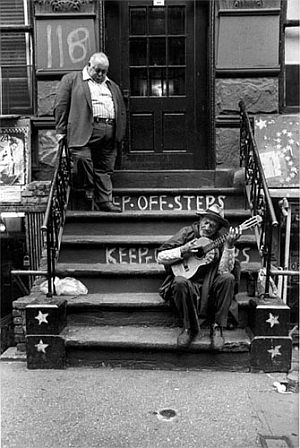
Macdougal Stoop
Jill Freedman
_______________________
"A Massacre of the World's Poor"
Food Riots and Speculators
Mike Whitney
The US is exporting its inflation by cheapening its currency. Now a field worker in Haiti who earns $2 a day, and spends all of that to feed his family, has to earn twice that amount or eat half as much. That's not a choice a parent wants to make. Its no wonder that six people were killed Port au Prince in the recent food riots. People go crazy when they can't feed their kids....(more)
_______________________
How is the world ruled and how do wars start? Diplomats tell lies to journalists and then believe what they read.
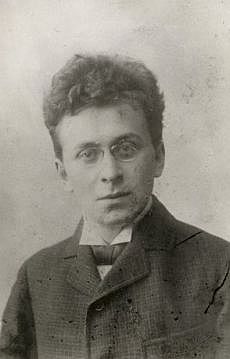
Karl Kraus
April 28, 1874 - June 12, 1936
photo by H. Ephron
1898
The Last Days Of Mankind: Readings From Karl Kraus
digitalized edition of die Fackel
'The Torch' A brief look at the Life and Work of Karl Kraus
Jessica Van Campen _______________________
VA confirms 18 vets commit suicide every day
RIGHTS-US: Vets' Lawsuit Opens Door on Suicides, Poor Care
Aaron Glantz
_______________________
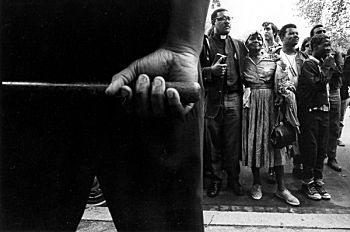 resurrection city
Jill Freedman
Through Weegee’s Lens
Niko Koppel on Jill Freedman
Class Resurrection
The Poor People's Campaign of 1968 and Resurrection City
Robert T. Chase
_______________________
Style
larval subjects
On the one hand, post-structuralist texts (and other similarly obscure texts) take on the logic of the veil. When confronted by the veil our desire is evoked. We are led to wonder what is behind the veil. The veil suggests something hidden, something tantalizing, something just out of reach. “What is it that Derrida is saying?” “What is the secret of Hegel’s Logic?” “Is Guattari saying anything at all?” The veil in writing either produces a violent reaction of rejection or a sort of hypnotic attachment in the reader like a moth drawn to a flame. On the other hand, if the effect of hypnotic attachment is successfully produced, if we become convinced that the text hides a secret, we become locked in a power relationship with text and authorship where the author is now a master containing the truth of a secret, and the reader is perpetually inadequate, always close to the elusive truth of the secret of late Heidegger, late Lacan, Deleuze, Derrida, etc., while also always falling short. Far from freeing the reader, far from liberating them, the reader instead is locked in identity as a disciple and apostle of the text, devoting, perhaps in the extreme case of the scholar, their entire life to the hermeneutics of the text that has now become sacred. In short, this textual practice stands in stark opposition to its often stated aim....(more)
extensive comments
Adam Kotsko on "Academic Stockholm Syndrome"

beavered
photo - mw

Pink Cloud
Paraskeva Clark
1898 - 1986 Canadian Paintings in the Thirties
Pictures from the 1930's
National Film Board of Canada
30 min 27 s thanks to mirabile dictu
_______________________
Hands Are Wood
Seth Abramson
Come see the woodpile behind the cannery.
Come through the wall
to where the wood was chopped
and the difficult wood was hewed.
There is a short history of commotion here,
where a sudden bonfire spat its surprise
at the sky —
a hundred feet or more the shavings swept
through disturbed air, and made their own
music, the music hands make, such a yellow
crackle and such a thrashing
in the morning.
...(more)
Poetry May 2008
_______________________
A Terrible and Silent Crisis:
The Destruction of the American Working Class
Dave Pollard reviews Joe Bageant's Deer Hunting with Jesus: Dispatches from America's Class War
Deer Hunting With Jesus explains through personal stories his brutal assessment of just how strong the class system in the US really is, why the classes are and always have been at war, and why that plays perfectly into the hands of the right-wing political and economic interests there. These are stories about the people Joe grew up with and calls friends, and to write about their lives so bluntly and candidly is an act of incredible courage and honesty.
This is a society where poverty and illness are stigmatized as symptoms of laziness, ignorance and self-neglect, a society built on two-way class vs class fear of the unknown and misunderstood. The principal determinant of one's class in America, and the hermetic worldview that comes with it, is education. (....)
When you read Joe's astonishing stories, all of a sudden what George Lakoff says makes sense. And, just as astonishingly, so does Bush's 2004 win, and the terrifying prospect that Republican arch-conservatives could be poised to establish a dynasty in the US that will accelerate the Cheney-Bush regime's project for endless war, bankrupting and dismantling government, and ending the separation of church and state, and which will last until that country's final, ghastly unraveling occurs (I'm betting that will happen later this century)....(more)
_______________________
Bill Moyers Interviews Rev. Jeremiah Wright
transcript
watch the interview part 1 and 2
_______________________
The Bland, Meaningless and Unthreatening Religion of the Ruling Class
Arthur Silber
_______________________
The Pentagon Strangles Our Economy
Why the U.S. Has Gone Broke
Chalmers Johnson
There are three broad aspects to the U.S. debt crisis. First, in the current fiscal year (2008) we are spending insane amounts of money on "defense" projects that bear no relation to the national security of the U.S. We are also keeping the income tax burdens on the richest segment of the population at strikingly low levels.
Second, we continue to believe that we can compensate for the accelerating erosion of our base and our loss of jobs to foreign countries through massive military expenditures -- "military Keynesianism" (which I discuss in detail in my book Nemesis: The Last Days of the American Republic). By that, I mean the mistaken belief that public policies focused on frequent wars, huge expenditures on weapons and munitions, and large standing armies can indefinitely sustain a wealthy capitalist economy. The opposite is actually true.
Third, in our devotion to militarism (despite our limited resources), we are failing to invest in our social infrastructure and other requirements for the long-term health of the U.S. These are what economists call opportunity costs, things not done because we spent our money on something else. Our public education system has deteriorated alarmingly. We have failed to provide health care to all our citizens and neglected our responsibilities as the world's number one polluter. Most important, we have lost our competitiveness as a manufacturer for civilian needs, an infinitely more efficient use of scarce resources than arms manufacturing....(more)
The Republican Erosion of America
Angel Of Mercy
_______________________
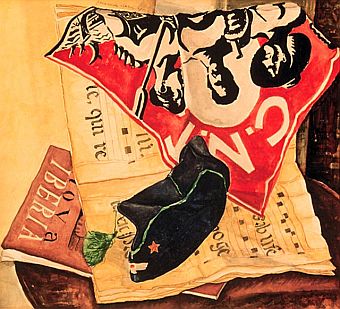
Presents from Madrid
Paraskeva Clark
1937
“You, artist of the Pre-Cambrian shield, have been born, unfortunately for your dreams, into an age when what one desires is not handed to one on a silver spoon, but has to be fought for, more grimly as each month goes by. It is to enable you to lie on a rock that castles are tumbling in Spain. ...
.....................................................
 Guernica
April 27, 1937
_______________________
Aspeers - Issue 1 (2008)
the first and currently only graduate journal for American studies in Europe
Seeing Through the Bell Jar:
Distorted Female Identity in Cold War America
Rosi Smith
Don DeLillo and Society’s Reorientation to Time and Space:
An Interpretation of Cosmopolis
Stuart Noble
via The Atlantic Community
_______________________
 on a ramble celebrating spring
and birthdays
photo - mw
.....................................................
“While still ‘young’ I began to seek consolation in the thought that then if ever, i.e. now, the true words at last, from the mind in ruins. To this illusion I continue to cling”
-
Beckett remembering himself
_______________________
The Book Depository
delivers book for free and it really is worldwide.
_______________________
Interview with Bill Johnston on Magdalena Tulli
Polish Writing
via Three Percent
I’ve always tried to minimize paratext in any form, and my hope is always that a work ought to be able to stand either completely or mostly alone—this is certainly the case with Tulli, who simply needs to be read carefully. You don’t need to know a lot of Polish history or culture to “get” her, I think. For me, footnotes and so on are a major part of the ghettoization of small literatures I referred to above, and I avoid them whenever I can—they make texts look like academic treatises rather than novels to be read and enjoyed.
Magdalena Tulli at Archipelago Books
_______________________
 photo - mw
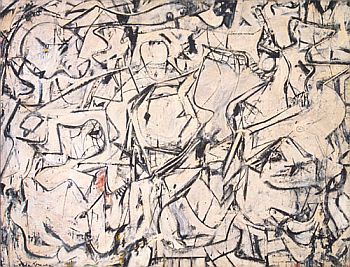
Attic
Willem de Kooning
1949
_______________________
my memory is the history of time
Towards a Theory of Time in Olson
Nate Pritts
Charles Olson says “we are a gross and chronological people” (Bibliography, 78). As such, we’ve got time on our minds. There are as many ways to look at the human and its relation to the passage of time as there are people looking. It’s a subjective process dealing with an objective field. Is the past separate from the present or is any conception of the past inextricable from its present-day conception? Does history only exist in the present?
_______________________
Remembering Jonathan Williams
Robert Kelly
The Brooklyn Rail
I miss the elegance of the man, the energy of the poet, and above all the generosity that made sure publishing was publick-ing, and that brought to the commonwealth (as he might call it), the shivering needy children we are, news that concerned us and made us better—or at least (often) made us laugh.
_______________________

Willem de Kooning
24 April 1904 - 19 March 1997
Photo: Fred W. McDarrah
_______________________
The myth of the "ownership society" confronts the reality of the "foreclosure society."
The great silence of the second Gilded Age may give way to the great noise of the
first.
The Great Silence
Our Gilded Age and Theirs
Steve Fraser
Certainly, Twain would feel right at home today. Crony capitalism, the main object of his satirical wit in The Gilded Age, is thriving. Incestuous plots as outsized as the one in which the Union Pacific Railroad's chief investors conspired with a wagon-load of government officials, including Ulysses S. Grant's vice president, to loot the federal treasury once again lubricate the machinery of public policy-making. A cronyism that would have been familiar to Twain has made the wheels go round in these terminal years of the Bush administration. Even the invasion and decimation of Iraq was conceived and carried out as an exercise in grand-strategic cronyism; call it cronyism with a vengeance. All of this has been going on since Ronald Reagan brought back morning to America....(more)
_______________________
A Finite Thinking
(Cultural Memory in the Present)
by Jean-Luc Nancy
download link
via Fark Yaralari
_______________________
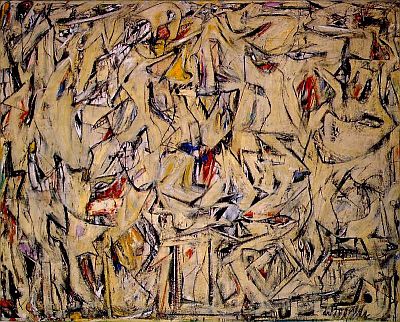
Excavation
Willem de Kooning
1950
_______________________
Palms
Nancy Leonard
Anthropologies of dance
By the beach—
The sand, white
The longest fronds
Lean protectively in this
Garden of palms & flowers
The little resistant one holds stiff thick fronds up & up;
Long mama can almost reach him
Wind kicks things up this morning.
All does not agree between west and east,
Of the same tree:
One leaning this way, wrapping the scrappy trunk
With camouflaging leaves.
The other pointing east, flinging off
The drag of trunk
dumbing down security of it all
(Maybe a hurricane will undo it)
...(more)
Nancy Leonard - Two Poemsconjunctions
_______________________
Thinking about Philip Jones Griffiths
George LeChat
I was reminded of something John Berger said in Uses of Photography
“In the private use of photography, the context of the instant recorded is preserved so that the photograph lives in an ongoing community. . . . The public photograph, by contrast, is torn from its context, and becomes a dead object which, exactly because it is dead, lends itself to any arbitrary use.” Thus, Berger argues for an alternative photography, the task of which would be “to incorporate photography into social and political memory, instead of using it as a substitute which encourages the atrophy of any such memory.”
And that’s what Griffiths' work was, the social and political memory of his time. _______________________
Words and Worlds:
Dada and the Destruction of Logos,
Zurich 1916
John Scanlan
toutfait
Dada was about the fakery of the language of reason, of a world divided and understood by such identities. It was about the essential truth of the idea that order can ever be really more than a neat arrangement of ‘things’ that could just as easily be displaced, or destroyed. This aspect of an identity that takes--extracts--itself, could be rationally autonomous in the sense that it is active; but it is also acting, or the metaphorical adoption of the mask that conceals a depth below the surface. Yet when the mask is actually utilized to point out, or make a reminder of how misleading appearances could be (as it was in the Cabaret Voltaire performances), the surface order of relations paradoxically vanishes under the confusion of what is presented being mediated through a symbol of deception , as Hugo Ball noted:
What fascinates us all about the masks is that they represent not human character and passions, but characters and passions that are larger than life. The horror of our time, the paralyzing background of events, is made visible .
...(more)
_______________________

Matthieu Gafsou
_______________________
Paul Ricoeur and a Hermeneutics of Human Capability and Fragility
Mornay Joy
_______________________
The University and the Undercommons: Seven Theses
Fred Moten and Stefano Harney
... this much is true in the United States: it cannot be denied that the university is a place of refuge, and it cannot be accepted that the university is a place of enlightenment. In the face of these conditions one can only sneak into the university and steal what one can. To abuse its hospitality, to spite its mission, to join its refugee colony, its gypsy encampment, to be in but not of—this is the path of the subversive intellectual in the modern university.(....)
This maroon community, if it exists, therefore also seeks to escape the fiat of the ends of man. The sovereign's army of academic antihumanism will pursue this negative community into the Undercommons, seeking to conscript it, needing to conscript it. But as seductive as this critique may be, as provoked as it may be, in the Undercommons they know it is not love. Between the fiat of the ends and the ethics of new beginnings, the Undercommons abides, and some find comfort in this. ...(more)
_______________________
Can You Read This? Don't You Wish You Couldn't?
Stan Persky reviews Susan Jacoby's The Age of American Unreason
Dooney's Cafe
_______________________
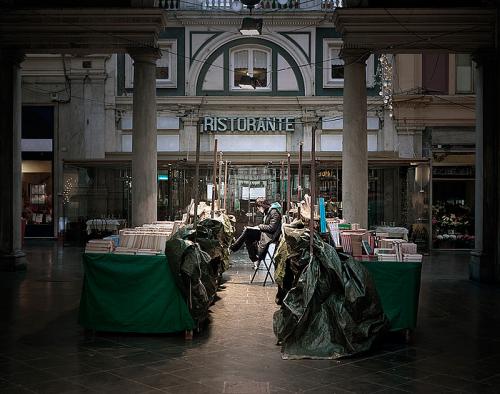
Matthieu Gafsou
via muse-ings
_______________________
It seems that we learn something about art when we experience what the word solitude is meant
to designate. This word has been much abused. Still, what does the expression to be alone
signify? When is one alone? Asking this question should not simply lead us into melancholy
reflections. Solitude as the world understands it is a hurt which requires no further comment
here.
We do not intend to evoke the artist's solitude either -- that which is said to be necessary to him for the practice of his art. When Rilke writes to the countess of Solms-Laubach ( August 3, 1907), "For weeks, except for two short interruptions, I haven't pronounced a single word; my solitude has finally encircled me and I am inside my efforts just as the core is in the fruit," the solitude of which he speaks is not the essential solitude. It is concentration.
The Solitude of the Work
In the solitude of the work -- the work of art, the literary work -- we discover a more essential solitude. It excludes the complacent isolation of individualism; it has nothing to do with the quest for singularity. The fact that one sustains a stalwart attitude throughout the disciplined course of the day does not dissipate it. He who writes the work is set aside; he who has written it is dismissed. He who is dismissed, moreover, doesn't know it. This ignorance preserves him. It distracts him by authorizing him to persevere. The writer never knows whether the work is done. What he has finished in one book, he starts over or destroys in another. Valéry, celebrating this infinite quality which the work enjoys, still sees only its least problematic aspect. That the work is infinite means, for him, that the artist, though unable to finish it, can nevertheless make it the delimited site of an endless task whose incompleteness develops the mastery of the mind, expresses this mastery, expresses it by developing it in the form of power. At a certain moment, circumstances -- that is, history, in the person of the publisher or in the guise of financial exigencies, social duties -- pronounce the missing end, and the artist, freed by a dénouement of pure constraint, pursues the unfinished matter elsewhere.
The infinite nature of the work, seen thus, is just the mind's infiniteness. The mind wants to fulfill itself in a single work, instead of realizing itself in an infinity of works and in history's ongoing movement. But Valéry was by no means a hero. He found it good to talk about everything, to write on everything: thus the scattered totality of the world distracted him from the unique and rigorous totality of the work, from which he amiably let himself be diverted. The etc. hid behind the diversity of thoughts and subjects.
Maurice Blanchot, The Space of Literature
Translated, with an Introduction, by Ann Smock
full text download here
_______________________

Two of these guys are celebrating birthdays in the next couple of days.
That would be me on the left
and brother Rod on the right.
Brother Tim, currently gone walkabout in Guatemala will have to wait a bit.
photo - my father, Windsor, 1957
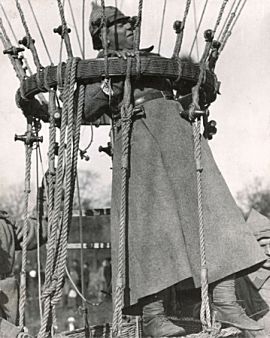
On the balloon
Maneuvers of the Red army
Alexander Rodchenko
1 2 3 4
_______________________
Book of the Forest Path
A New Rendition of the Tao Te Ching
Crispin Sartwell
21
A path through the forest
is merely where the trees aren't:
a clearing or absence.
What is it? Where is it?
These are not exactly the right questions;
it is an absence in space
that is also the way you are going.
It is surrounded by trees;
if it had a nature, that would be it:
the stuff all around it that touches
and shapes the emptiness within it.
But that's where you move, isn't it?
That's how and where you go.
It is a useful emptiness, an effective absence.
You've never left it, even if you think you have,
and everything you've seen, you've seen from it.
I know it because here I am.
_______________________

Odilon Redon
April 22, 1840 - July 6, 1916
_______________________
A Supplement to Imagining Language
portfolio edited by Tony Tost
A Note on A Supplement to Imagining Language
Tony Tost
This portfolio, or supplement, is not really intended as any kind of prosthesis to Imagining Language, nor does it intend to compensate for any possible lack in IL. It is an attempt to model some of the ways that this big, strange book may serve as a kind of unsanctioned yet extremely compelling stance towards knowledge, inheritance, and language. And perhaps more practically, this portfolio is specifically geared for those unfamiliar with the book: I wish to present a slight glimpse of the range and type of work to be found in Imagining Language.
thanks to Laura Carter at post-dérives
_______________________
Hunger Plagues Haiti and the World
Steve Lendman
Kissinger made a chilling 1970 comment that explains a lot about what's happening now - "Control oil and you control nations; control food and you control the people." Combine it with unchallengeable military power and you control everything, and Kissinger likely said that, too.
He said plenty more in his classified 1974 memo on a secret project called National Security Study Memorandum 200 (NSSM 200) for a "world population plan of action" for drastic global population control. He meant reducing it by hundreds of millions, using food as a weapon, and overall reorganizing the global food market to destroy family farms and replace them with (agribusiness-run) factory ones. It's been ongoing for decades, backed since January 1995 by WTO muscle, and characterized now by huge agribusiness giants with monstrous vertically integrated powers over the food we eat - from research labs to plantings to processing to the supermarket and other food outlet shelves around the world.
But it's even worse than that. Today, five agribusiness behemoths, with little fanfare and enormous government backing, plan big at our expense - to control the world's food supply by making it all genetically engineered with biofuels one part of a larger scheme....(more)
_______________________
... the twentieth century that we have chosen to commemorate is curiously out of focus.
What Have We Learned, If Anything?
Tony Judt The New York Review of Books
The overwhelming majority of places of official twentieth-century memory are either avowedly nostalgo-triumphalist—praising famous men and celebrating famous victories—or else, and increasingly, they are opportunities for the recollection of selective suffering.
The twentieth century is thus on the path to becoming a moral memory palace: a pedagogically serviceable Chamber of Historical Horrors whose way stations are labeled "Munich" or "Pearl Harbor," "Auschwitz" or "Gulag," "Armenia" or "Bosnia" or "Rwanda"; with "9/11" as a sort of supererogatory coda, a bloody postscript for those who would forget the lessons of the century or who failed to learn them. The problem with this lapidary representation of the last century as a uniquely horrible time from which we have now, thankfully, emerged is not the description—it was in many ways a truly awful era, an age of brutality and mass suffering perhaps unequaled in the historical record. The problem is the message: that all of that is now behind us, that its meaning is clear, and that we may now advance—unencumbered by past errors—into a different and better era.
(....)
We are slipping down a slope. The sophistic distinctions we draw today in our war on terror—between the rule of law and "exceptional" circumstances, between citizens (who have rights and legal protections) and noncitizens to whom anything can be done, between normal people and "terrorists," between "us" and "them" —are not new. The twentieth century saw them all invoked. They are the selfsame distinctions that licensed the worst horrors of the recent past: internment camps, deportation, torture, and murder—those very crimes that prompt us to murmur "never again." So what exactly is it that we think we have learned from the past? Of what possible use is our self-righteous cult of memory and memorials if the United States can build its very own internment camp and torture people there?
Far from escaping the twentieth century, we need, I think, to go back and look a bit more carefully. We need to learn again—or perhaps for the first time—how war brutalizes and degrades winners and losers alike and what happens to us when, having heedlessly waged war for no good reason, we are encouraged to inflate and demonize our enemies in order to justify that war's indefinite continuance. And perhaps, in this protracted electoral season, we could put a question to our aspirant leaders: Daddy (or, as it might be, Mommy), what did you do to prevent the war?...(more)
_______________________

The Fool
(Intuition)
Odilon Redon
_______________________
Aime Cesaire, 1913-2008:
Remembering the Life and Legacy of the Black Pride Poet and Anti-Colonial Activist
"Democracy Now
http://www.democracynow.org/2008/4/21/aime_cesaire_1913_2008_remembering_the
_______________________

Mother’s portrait
Alexander Rodchenko
1924
_______________________
Search Stanford titles with Google Books
Stanford University Press is pleased to announce that you can now search the full text of our books via Google Book Search.
... there are already over a thousand Stanford titles in Google Book Search. When the project is completed, all of our books will be searchable electronically.
via ReadySteadyBlog
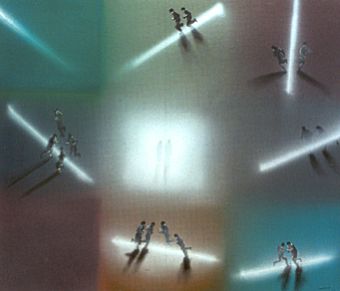
Los espejos transparentes
Juan Genovés 1 2
_______________________
from
Only the inaccessible flowers:
Poetry and prose of Philippe Jaccottet
translated by Louis Simpson
VII
I am impatient and I am anxious;
who knows the wounds and knows the treasures
that another life brings? Spring may
leap toward joy or blow towards death.
-Here's the blackbird. A timid girl
comes out of her house. Dawn is in the wet grass.
(....)
I am thinking: the pond is a mirror one could have taken at daybreak from wardrobes of grass; the foam is lingerie fallen at the feet of a woman who has just taken off her clothes. So desire would be born, as a fire ignites, a graceful and disturbing idyll, but one that, perhaps without one's being aware, superimposes itself on something simpler that I surprised. I imagine that, following this line of thought, I could write a poem (a kind of madrigal, but not entirely traditional, that would take from its basis in nature a more savage flavor)-if I did not already know, confusedly, that my emotion at the moment did not have that rosy flesh color that immediately vanished. So I confirm by experience what has become a rule of poetry for me (the danger of an image being "derivative"), and these tentative, repetitious probings are justified as they feel their way to a solution.(....)
And here I am, questioning again, balancing, welcoming images in order to discard them, attempting to strip the sign of that which would not be rigorously interior; but also fearing that, once stripped in this way, it may entrench itself more deeply in its secret....(more)
_______________________
from
The Edge of the Woods
Yves Bonnefoy
But I have no response: for words
Have something cruel about them, they refuse
Themselves to those who love and honor them
For what they might be, not for what they are.
And nothing stays with me but images,
Almost enigmas, which would turn
Your gaze away and leave it suddenly sad,
Your gaze, that takes in only what is clear.
You see, it's like a morning in the rain,
One goes to lift the water's hem
...(more)
_______________________

On the Wall
Olivia Parker
_______________________
from
Media and Her War Machines
Iona Flora
translated from the Romanian by Adam J. Sorkin with Alina Cãrãc
archipelago
About Raising the Waters to the Heights
Once again, as if nailed to this oak bench, I sit at the oak table
in the kitchen garden, pensively watching
the neat rows of tomatoes, garlic, cabbage,
the dill that has no intention of growing
under my eye greedy for the real.
As I have said, at the low table I leaf through random chapters of
the massive document where the author explains,
in the most minute detail,
how a truly enlightened Battle Commander can subdue
a walled city, however proud, defiant, hostile:
“Without the water of the river that courses through the city, the mills are doomed,
and along with them, the tanners’ trade as well as the wool and dye shops;
soon the city’s populace must decide to yield to the greater power
and be grateful with obedience.”
About the water, about drawing it off and depositing it somewhere at the heights,
the old author writes that it will sparkle with sun because
“it will thereby have been restored whence it originated.”
And about the water that turns the wheel, having fixed upon the axle
the bellows that fan hot coals in the forges, one may also say that
it will be of practical advantage in the churches
“for sounding the organs and giving praise
to the Lord.”
...(more)
_______________________
 photo - mw _______________________
The Human Abstract
Elizabeth Willis
iv. a few stones for Lorine Niedecker
.......
what bird would light
in a moving tree?
the tree I carry
what is the use
if her beauty goes
wasted on me
I said to my head
I live unburied
I am standing up
.............
Against this house I always hammering
the green of a fountain
the original honor of the thing
Measured by message
I had a round of distance
till a city found me
A tinny betrayal of origin
(not stealthy not stone)
The eyebright in season
and not the storm between
I'm late and come adrift
...(more)
Elizabeth Willis on Close Listening
Reading [mp3]
In conversation with Charles Bernstein [mp3]
_______________________
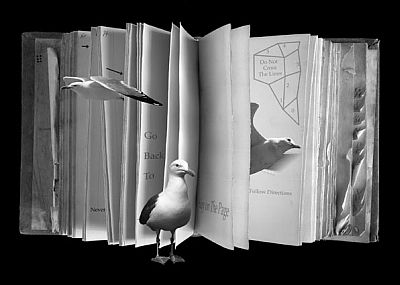
A Book of Broken Rules
Olivia Parker
1 2 3
_______________________
Breaking into the Spell
An interview with Ursula K. Le Guin
Guernica: You mention in your interview with FEMIN that you had to learn to write as a woman—this was very interesting to me, and I would appreciate anything you could add to that. It describes an amazing gap between what one is and what one must be to live—a gap created by the culture into which one is born, and created by what that culture feels are its necessities, which, I think, is one of your themes. What was the moment when you first became aware that you would need to learn this, and how did you go about it once you knew it was what you must do?
Ursula K. Le Guin: I like your metaphor of the gap. So many people live in such a gap! And they have to decide whether they want to pretend it isn't there, or find out how to live in it, or try to close it. Or—mostly—life decides that for them. To have a choice at all is to be privileged....(more)via NewPages Blog
GuernicaA Magazine of Art & Politics
_______________________
Between the face and the voice: Bakhtin meets Levinas
Daphna Erdinast-Vulcan
Continental Philosophy Review
Mikhail Mikhailovitch Bakhtin and Emmanuel Levinas are philosophers of exile. Writing on the ruins of a civilization, they share both the sensibilities of survivors in a world whose onto-theological fundaments have collapsed, and an incurable temperamental religiosity which persists in the face of that collapse. Indeed, the affinity between these two philosophers of alterity—far beyond the mere accident of their common antecedents, mother-tongue and cultural contexts—will not come as a revelation to readers of either thinker. Both Bakhtin and Levinas set out on a quest to recover ethics in the absence or against the silence of God; both can no longer find consolation in the metaphysics of presence and totality, or resort to the legacy of the absolute; both have been disinherited in more than one sense....(more)
Continental Philosophy ReviewMarch, 2008 _______________________
... almost no safety net between sentences as the sun rises again spectacularly over kensington brooklyn and i happen to sit with windows open as they can be.
as it takes about ten thousand hours to be good at anything, i am perhaps in the exact middle of the distance right now, mumbling to myself that there is no water here and that it is not very pleasant to continue and yet that it is also of no use in turning back.
so with every word added, i put myself closer to the spot where i will be allowed to see spaces again, and periods and dashes and paragraphs and chapters and headers, footers and blocks of things.
- Witold Riedel
_______________________
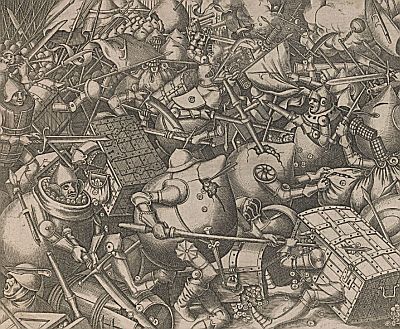 detail
Fight of the Money-Bags and the Coffers
Pieter van der Heyden
(fl. 1557)
Coin and conscience
popular views of money, credit and speculation
_______________________
Farewell to suburbia
James Howard Kunstler
We're going to discover the hard way that the project of suburbia represents the greatest misallocation of resources in the history of the world. We will have to occupy the landscape differently in the years ahead. Yet, the enormous sunk costs of suburbia are very likely to provoke a furious campaign to sustain the manifestly unsustainable. The political implications of that are pretty unappetizing.(....)
I think the stark truth of the matter is that no combination of alternative fuels will allow us to run the North American highway network, Wal-Mart, and Walt Disney World -- or even a substantial fraction of those things. Because of our sunk costs in Happy Motoring, we will surely try everything -- solar, wind, nuclear, bio-fuels, used french-fry oil -- and we will surely be disappointed by what they can actually do for us. The problem is that they don't scale.(....)
The public discussion in both the United States and Canada about how we will manage this epochal transition out of the oil age ranges from incoherent to delusional these days.
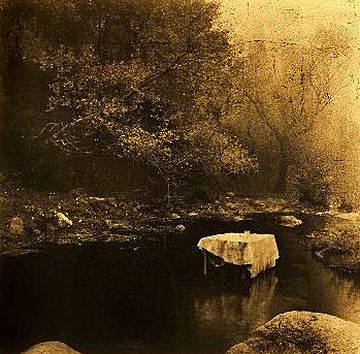
Luis González Palma
1 2 3 4
Light and darkness, song and scream,
the photographic work of Luis Gonzáles Palma
Fernando Castro R. _______________________
Signs and Symptoms
Robert Gal
translated from the Slovak by Charles Sabatos
Exquisite Corpse
II
In the reflection of the water-mirror the surface of translucence points to its hidden elemental nature. Memory is in the trace of reflections which we conceal like one and the same jewel. Its strangeness is a boomerang.
_______________________
Extract from a Phenomenology of Involuntary Body Memory
Dylan Trigg
Side Effects
Increasingly, I am becoming convinced that not only is the body’s absorption of the past more detailed and more fluid than cognitive memory, but that it is also possible the body memory aligns itself with calendar time. The result of this is that we feel tremors of past places with greater intensity as they are repeated annually. In this way, the body becomes its own memorial to past events, its own haunting ground for creating smoke signals to previous episodes of absorption....(more)
_______________________

Jon Edwards Jon Edwards: Photographs
_______________________
A life richly lived
Walter Benjamin by Esther Leslie
Review by Farhang Erfani
Leslie shows us the remarkable intellectual continuity of the work that has defined his voice. From the beginning Benjamin valued failures and ruins.
Speaking of beginnings, Leslie tells us of Benjamin’s fascination with children. Not only do children devour the world and are they most “receptive” to their environment, they also engage the world; they are not passive recipients—a virtue whose lack Benjamin deplored in adult lives. Like Benjamin, children are drawn to “any site where things were being visibly worked on”; they are “irresistibly drawn by the detritus generated by building, gardening, housework...By playing with the broken-down and the unwanted, children combine ‘materials of widely differing kinds in a new, intuitive relationship.’” This positive childish attitude, the inquisition into ruins for the sake of creativity, became the hallmark of Benjamin’s own writings and reflections. ...(more)
Internet Review of Books April 2008
_______________________
Reading Film with Lacan
10 parts at youtube
This is a seminar by Dr. Sean Homer about Lacan's concept of Jouissance, object a and desire and how he makes use of the concept to discuss some European films.
via Continental Philosophy
_______________________
Remembering Aimé Césaire
Global Voices Online
_______________________
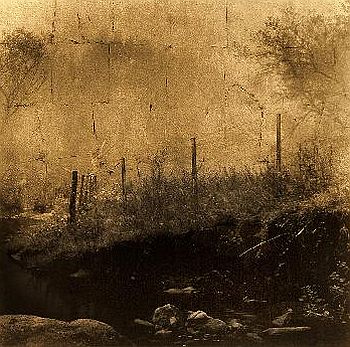
Luis González Palma
_______________________
A Ritual To Read To Each Other
William Stafford
If you don't know the kind of person I am
and I don't know the kind of person you are
a pattern that others made may prevail in the world
and following the wrong god home we may miss our star.
For there is many a small betrayal in the mind,
a shrug that lets the fragile sequence break
sending with shouts the horrible errors of childhood
storming out to play through the broken dyke.
And as elephants parade holding each elephant's tail,
but if one wanders the circus won't find the park,
I call it cruel and maybe the root of all cruelty
to know what occurs but not recognize the fact.
And so I appeal to a voice, to something shadowy,
a remote important region in all who talk:
though we could fool each other, we should consider--
lest the parade of our mutual life get lost in the dark.
For it is important that awake people be awake,
or a breaking line may discourage them back to sleep;
the signals we give--yes or no, or maybe--
should be clear: the darkness around us is deep.

William Stafford
1914 - 1993 1 2 3 4
_______________________
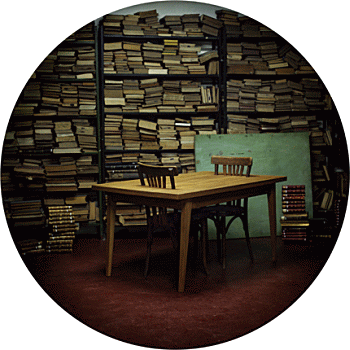
Luis González Palma
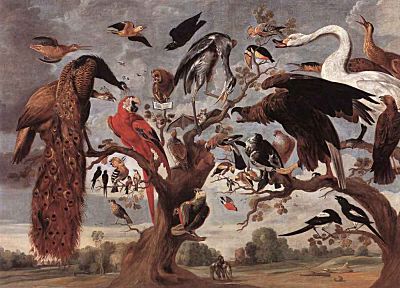
The Mockery of the Owl
Jan van Kessel
ca.1626-1679
_______________________
Casida of the Branches
The dogs of lead have arrived
among the orchards of the Tamarit
hoping that they might fell the branches,
hoping that they alone might break them off.
The Tamarit has an apple-tree
with an apple of sobs.
A nightingale extinguishes the sighs,
and a pheasant chases them through the dust.
But the branches are joyful,
the branches are like us.
They do not think in the rain and have slept
as if they were trees, suddenly.
...(more)
Federico Garcia Lorca: Two poems
translated by Gilbert Wesley Purdy
jacket
_______________________
Middle Spaces: Media and the Ethics of Infinitely Demanding
Daniel Punday
A review of: Simon Critchley, Infinitely Demanding: Ethics of Commitment, Politics of Resistance
electronic book review
The novel has long been associated with ethics. This link goes back to F.R. Leavis, but Andrew Gibson has shown that this tradition is alive and well today not only in the work of humanist critics like Wayne Booth, but among postmodernists like Richard Rorty and J. Hillis Miller. One way to interrogate Simon Critchley's theory of ethics and political resistance in Infinitely Demanding is to set it alongside of contemporary novels and to ask how they respond differently to the same cultural moment....(more)
_______________________
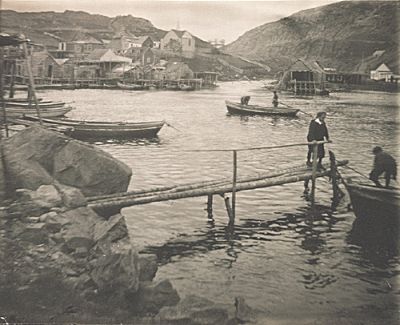
Child on Dock
Gertrude Kasebier
ca. 1898 1 2 3
_______________________
Transfigured
Cathal ÒSearcaigh
I am getting ready to become a tree,
not because some god is after me,
bearing down with his aerial authority,
my heart bolting from the thrust of his need.
My figure will be transfigured, in one go;
my human shell turned to the trunk of an oak,
my skin twisted to gnarled bark, my blood-flow
to sap. Out of my branch-bones leaves will grow.
Already, my fingers and toes are stretching out,
elongating into sinewy roots,
tucking themselves tightly into the ground;
and when a breeze blows my branches round,
I feel as if I’m going nuts, or out
of my tree. Today I stand tall and straight,
not breathing but rustling; birds congregate
in me, warbling airs while I create
chlorophyll, inspired by unfathomable light
to fulfil my destiny, synthesise my fate.
Twenty-two Irish and Scottish Gaelic Poems, Translations and Artworks
An Leabhar Mòr - The Great Book of Gaelica special presentation of Archipelago
An Leabhar Mòr / The Great Book of Gaelic is an international collaborative artwork bringing together the work of more than 200 visual artists, poets and calligraphers from Scotland and Ireland. It has generated an international touring exhibition of 100 artworks, a book publication, a television documentary, a series of BBC radio programmes, a music CD, a schools pack and an events programme. Following the exhibition tour (until 2008) the artworks will be bound into one volume to form a visual anthology and a permanent visitor attraction.
See: The web site for the book.
_______________________
Transport informatics
Dan Hill
... a quick survey of new informational approaches to transport, hinging on individual behaviour and engagement via public data.(....)
Data, transported and shaped by the internet, is increasingly becoming a primary way that people expect to engage with public transport in particular. Engage, as in access and navigate through transport service information, but also explore and understand the transport service itself.(....)
... engaging with the energy output of transport is something people may directly engage with too, to help shift behaviour. ...(more)
Dan’s piece is well worth reading, and I’m grateful to have been introduced to so many new projects and initiatives in this area. But I’d also like to encourage a bit more critical take on the social and cultural assumptions that underpin this vision. For example, what people and places are immediately or effectively excluded from these technosocial scenarios? What kind of infrastructural changes are needed to ensure that transport systems function as “continuous broadcast networks”? As complex systems produce or generate more and more complex data, what kinds of systems or systemic relations are needed to make personal or communal use of the data, or to protect ourselves from having data used against us?
- Anne Galloway (Space and Culture)
see also Dan's The street as platform
_______________________
How IBM Helped Automate the Nazi Death Machine in Poland Final Solutions
Edwin Black
author of IBM and the Holocaust
IBM and its German subsidiary custom-designed complex solutions, one by one, anticipating the Reich's needs. They did not merely sell the machines and walk away. Instead, IBM leased these machines for high fees and became the sole source of the billions of punch cards Hitler needed.
IBM and the Holocaust takes you through the carefully crafted corporate collusion with the Third Reich, as well as the structured deniability of oral agreements, undated letters, and the Geneva intermediaries -- all undertaken as the newspapers blazed with accounts of persecution and destruction.
.....................................................
It was a strategic business alliance. Perhaps more frighteningly, it was the dawn of the era - ours - in which what we now call "information technology" tended to help destroyers and mass murderers more than peace-loving governments. It's all about the real dangers of human taxonomies - identifying a person in a fixed (1's and 0's) sort of way.
- Al Filreis
_______________________
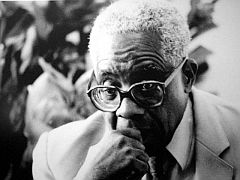
Aimé Césaire
(June 25, 1913 - April 17, 2008)
via Pierre Joris
An excerpt from "Notebook of a Return to the Native Land"
Aimé Césaire
Translated by Annette Smith and Clayton Eshleman
At the end of daybreak burgeoning with frail coves, the hungry
Antilles, the Antilles pitted with smallpox, the Antilles dyn-
amited by alcohol, stranded in the mud of this bay, in the dust
of this town sinisterly stranded.
At the end of daybreak, the extreme, deceptive desolate eschar
on the wound of the waters; the martyrs who do not bear witness;
the flowers of blood that fade and scatter in the empty wind
like the screeches of babbling parrots; an aged life mendacious-
ly smiling, its lips opened by vacated agonies; an aged poverty
rotting under the sun, silently; an aged silence bursting with
tepid pustules,
the awful futility of our raison d'être.
_______________________

photo - mw
_______________________
The world is an invasion.
The Invisible World Is In Decline
Bruce Whiteman Coach House Press
While you were looking the
other way the poet left on a
fishing trip. His wicker
fishing basket is full of
invisible fish that remain
magically incorrupt. A freak
planetary windstorm
dumped them in his lap with
an electronic thump. He is
lost in the woods on his way
to a lake whose name he
doesn't know. The surveyors
missed it in their elaborate
and fruitless maps.
Extraterrestrial insects buzz
menacingly around his
elliptical head. Worms
wriggle breathless in the
rusty tobacco can that reads
'when a feller needs a
friend'. He trips on a fallen
mossy log and the poetry of his elliptical fall is complete
and inescapable.
The mechanics of public
testimony are inscrutable.
Someone somewhere
initiates a broadcast signal
and a million televisions
snap into instant-on, but no
one is watching. Images out
of a deathless present
converge and dissipate in
empty rooms. The electronic
switch of memory is frozen
in the on position of
bereavement. A voice from
somewhere is drowned in
the flail and hubbub of
ninteenth-century politics
and postlapsarian sex. The
poet takes steroids for his
blood condition and the
metal plate in his skull is the
focus for short-wave signals
of a dizzying variety and
multiplicity of sources. He
pretends a total
incomprehension of public
television and private
copulation. A mother robin
defending her two blue
eggs from his guarded
investigation of the
half-hidden nest swoops
down to peck his head and
flies off chirping a perfect
language he tries to
understand. His friends
recede further and further
into the babble of
commonality. He subsides
into what he perceives as
the public conversation
of trees.
...(more)
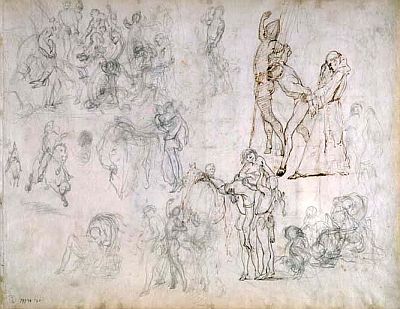
Sterne's 'Sentimental Journey'
Ford Madox Brown
April 16, 1821 - October 6, 1893
_______________________
Rhetoric that Binds and Blinds
Wole Soyinka
There are no innocents: This accentuation of the earlier rhetoric - all property is theft which makes us all thieves since we protect life as property, however temporarily, is what marks the difference between the rhetorical hysteria that held the world in thrall in those fervid sixties and early seventies on the one hand, and the nature of what assails us today. Merge those two shorthand rhetorical triggers and we arrive at the zone of gospeling that claims that All life is theft, and thus may be restored to its legitimate owner by any true believer, and as rapidly as possible. If only we could persuade the apostles of such gospels of the infinite virtue of modesty that resides in leaving such restoration to the personal intervention of the divine proprietor! Alas, they have constituted themselves into agents of restitution, where innocents pay sudden forfeit, without even the consolation of first seeking divine forgiveness for the lamentable lapse of being alive.
The question we must now confront is this: who or what are the principal agents of the season of rhetorical hysteria that now seeks to bind and blind the world within our climate of fear? ...(more)
Climate of Fear
Wole Soyinka BBC - Radio 4 - Reith Lectures 2004
This Past Must Address Its Present
Wole Soyinka
Nobel Lecture, December 8, 1986 Interviews with Wole Soyinka
Stanford Presidential Lectures in the Humanities and Arts _______________________
"And it's not surprising then they get bitter, they cling to guns or religion or antipathy to people who aren't like them or anti-immigrant sentiment or anti-trade sentiment as a way to explain their frustrations."
Obama, Bitterness, Fundamentalists and Guns
Media Shit Storms and Heartland Reality
Joe Bageant
While not precisely correct, it's a good enough generalization for an American audience not really listening anyway. Obama's remarks were not in the least controversial and just plain boring in terms of content. Certainly not newsworthy.
Yet he had no sooner closed his mouth than this media manufactured hell broke loose. "Oh my gawd," they screamed. This guy has the unmitigated gall to suggest that their might be some bitterness out here in the lily white realms of Grant Wood, grange halls and Methodist church suppers! Right here in River City!" where the combination of God rhetoric and Chamber of Commerce boosterism have managed to ban the word from public discourse. Even the mention of it can be explosive, simply because there is so much if it stuffed inside working folks, inside the lockbox of denial that comes with being the citizen of a culture in collapse.(....) Obama has proven you cannot even use the innocuous word bitterness in conjunction with the national lie of white American culture. In the officially sanctioned media lexicon, Blacks can be angry, disillusioned and even bitter enough to burn down Watts. But the white race, being blessed by a Christian god and divine providence, never harbor bitterness in their hearts. The reason the word bitterness has caused such horror is because what is really going on out there is the sprouting seeds of class animosity. And no candidate or pontificating media mugwump dares touch that one because they are in the class that benefits from our classist society....(more)
_______________________
from
Operations
Tony Hoagland
at 3quarksdaily
Someday you will required to perform a terrible
deed
in order to save yourself,
but save yourself for what?
That would be a question for Operation
Self-Examination to answer,
which is a very painful operation
performed without anesthesia
in a naked room full of shadows and light.
Perhaps I might suggest, instead,
Operation Self-Medication, or Operation Endless
Mindless
Distraction?
In the meantime Operation Collateral Amnesia
is running very smoothly.
...(more)
_______________________

photo - mw
|














































